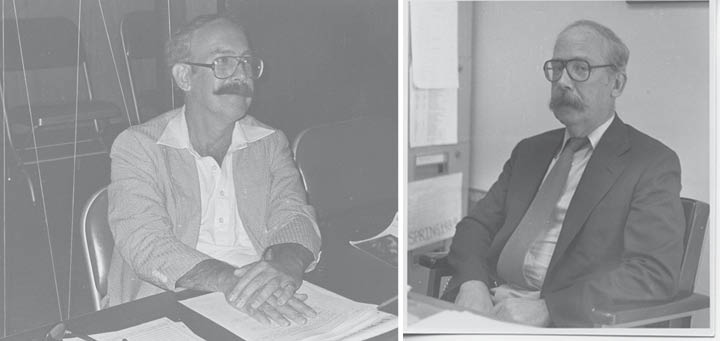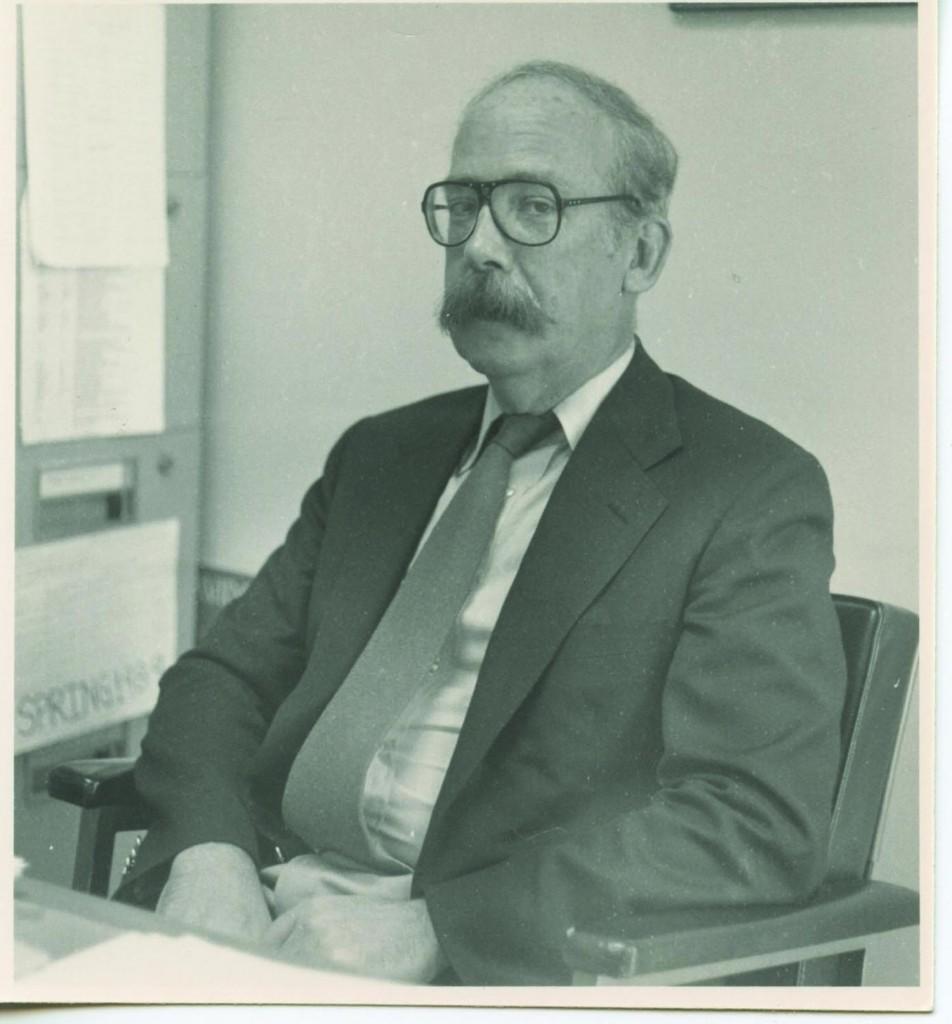Understanding Historical Change: Gustavo Umpierre
October 17, 2012

The Observer office was a mess, buried in old issues, post-its with layout corrections and discarded water bottles. After cleaning for hours, I happened upon a file folder filled with photographs from years past. I sat down for a while and sifted through the photographs, feeling the impact as I looked down at the faces of students, professors and administrators from years, even decades, ago. We are here now, they came before us, and more people will come after us.
It is a funny thing to actually think about, but even days later I couldn’t help but feel guilty about shoving these people, confined in their faded, black-and-white photos, back into the file folder. So I dug them out again and found one person in particular who was especially interesting. The mustachioed, bespectacled gentleman was looking away from the camera like something had caught his eye, obviously smiling. I found another. This time sitting still and stoic, glaring at the camera.
The back of the photo read “Prof. Gustavo Umpierre—Date Unknown” in elegant script.
Digging through The Observer archives, I came to find out a lot about Gustavo Umpierre, and I learned even more through conversations with some of his former colleagues who worked with Umpierre during his almost 20-year period at Fordham College at Lincoln Center (FCLC), a period marked by immense change, a period of change Umpierre took part in to better our university.
In an “In Memoriam” piece, which ran in “Boletín,” the newsletter of the Latin American & Latino Studies Institute (LALSI), Susan Berger, professor of political sciences, revealed more about his history. Umpierre, born in 1931 in Puerto Rico, left his home at the age of 17 to join the U.S. Army. His service during the Korean War earned him the rank of sergeant as well as the United Nations Service Medal and the Korean Service Medal with three Bronze Stars.
“He used the army to get away from family problems he was experiencing at that time, so I think he saw it as a release rather than a burden,” Berger said.
He went on to become a scholar of Spanish literature, specializing in the works of Lope de Vega and becoming a renowned Cervantes scholar. He studied at American University and Columbia University with the help of the GI Bill. After graduating, he was awarded a Fulbright scholarship, which he used to continue his studies in Madrid.
“He didn’t go the straight line of a usual academic. He kind of made his own way,” Berger said.
He came to Fordham in 1978. “When he came to Fordham, they needed someone for the Puerto Rican studies, and he took over. And he always used to joke ‘It’s because I am Puerto Rican.’ But he said he had no academic background in Puerto Rican studies, so he trained himself,” Berger recalled.
This dedication to academia was not only apparent in his attitude toward material, it was also in his attitude toward his students. “He was a very caring guy and he put a lot of energy into his students, and he was always here; every single day he would come. He kept up with students after they left. He took a very strong mentoring role with the students even after they left Fordham. He was just a great professor,” Berger recalled.
“Yes, I think he tried to help students, particularly students he felt were good students. He didn’t like students who were not serious students,” Clara Rodriguez, professor of sociology, agreed.
Umpierre’s tenure at FCLC coincided with several changes in structure. Before the drastic reorginization of departments to align more with the Rose Hill campus, FCLC was its own college with a separate curriculum. Student protests resulted in the creation of the Puerto Rican Studies Institute (PRSI) and the Black Studies Institute (BSI), known collectively as “The Institutes,” in 1972.
But he wasn’t just present for these changes—he was a part of them.
As the university began another reconstruction, the PRSI, under Umpierre’s directorship, and the BSI “pioneered and fought hard” to incorporate the idea of an American Pluralism course to the core requirements. The success of their dedicated action is apparent today with the continued inclusion of American Pluralism in Fordham’s extensive core. The American Pluralism classes “were very, very successful. People were interested in these areas, as they still are,” Rodriguez said.
Umpierre’s dedication to the creation of the American Pluralism requirement was driven by his desire to bring some of the issues related to the Institutes, like American ethnicity, nationality, and culture, to FCLC students.
In addition to his influence in the creation of the American Pluralism requirement, Umpierre took advantage of another restructuring opportunity to transition from the PRSI to the LALSI. Héctor Lindo-Fuentes, professor of history, who now inhabits Umpierre’s old office, recalled Umpierre’s efforts, “During that very complicated process, the Latin American Studies groups merged and we became the Institute for Latin American Studies. And Professor Umpierre was very involved in that from this very office.”
“Dr. Umpierre was instrumental in designing, planning and negotiating for the creation of today’s LALSI during the college’s restructuring,” Berger recalled in her “In Memoriam” piece.
“The unexpected characterized much of his rich and interesting life,” wrote Berger in her memorial. His relocation to Maine upon retirement in the mid 90s was is an obvious example. An even better example was his secret collection of African art.
“I knew him as a person of modern languages, a man of Spanish literature, but he also was, apparently, a quite adroit collector of African art, early on, before it had caught on. And I remember him showing me some of his pieces and I was impressed with how serious he was about that,” Rodriguez said.
According to his obituary, Umpierre died unexpectedly in his Maine home on March 6, 2011. He was buried in Puerto Rico.
While Umpierre may no longer be with us, what he accomplished and the people he influenced still are, a feat that should not be overlooked by any student of the Fordham community. It’s easy to forget that everything FCLC has and stands for was created by many people before us, people hanging on the outskirts of memory and history. But it is important to respect the efforts of such people as Umpierre, pioneers whose dedication to change allow us to focus on new and exciting issues, allowing us to leave our own legacy at FCLC.











samaris ayala • Aug 13, 2019 at 4:11 pm
Fordham jesuit tradition is real
not just public relations.